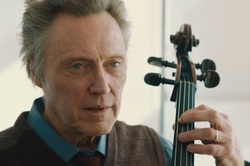
A Late Quartet is a meticulous film. And that’s as it should be, given its subject: the tensions that bind together and threaten to pull apart a professional string quartet.
It’s soon revealed that the quartet’s cellist, Peter Mitchell (Christopher Walken) is suffering from the early symptoms of Parkinson’s disease. In Walken’s hands, Peter is a stoic: he accepts that his career will shortly end, but wants the quartet to carry on without him.
In this, Peter is supported by first violinist Daniel Lerner (Mark Ivanir). Ivanar’s Daniel is fiercely dedicated to his art – and also to his professional standing – and isn’t about to let his or anyone else’s emotions get in the way.
Then there’s the couple: second violinist Robert Gelbart (Philip Seymour Hoffman) and his violist wife, Juliette (Catherine Keener). Seymour Hoffman and Keener deftly play off each other’s insecurities: neither are quite sure where they’ll stand or what they’ll do when Peter leaves the quartet.
Robert impetuously seizes the moment to announce that he’d like to alternate playing first violin parts with Daniel. He feels professionally affronted when Daniel refuses to share the first violin chair – and personally betrayed when his wife doesn’t support the idea, either.
That’s when things really start to unravel. Robert has a brief affair with a dancer (Liraz Charhi), Juliette dumps him when she finds out about it – and Daniel becomes romantically involved with the Gelbart’s daughter, Alexandra (played with youthful fragility by Imogen Poots).
Yet the quartet’s artistic values are so ingrained that they continue to rehearse together, even as their personal lives spin out of control. In A Late Quartet, the sanctity of music and music-making always comes first. When Robert learns that Daniel is sleeping with Alexandra, he carefully places his violin in its case before punching Daniel in the face.
This sudden act of violence comes as a shock in a film that’s otherwise poised and visually elegant. Zilberman’s warm and inviting interiors are juxtaposed with wide shots of Central Park covered in a pristine blanket of snow.
Perhaps there’s not as much music in this film as some string quartet fans might hope for. But musically, there’s no lack of quality: the soundtrack was recorded by the Brentano Quartet, one of the top chamber ensembles active today.
If you’ve ever wondered what happens to Juilliard kids when they hit middle age, Zilberman offers an answer. A Late Quartet is finely etched picture of the dedication, challenges and rewards that go into a life of quartet playing, enfolded in a taut and well made drama.
© Colin Eatock 2012
 RSS Feed
RSS Feed

